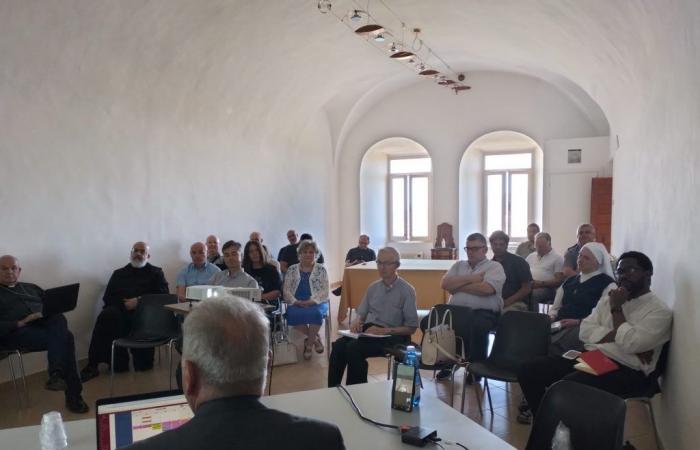
Photos and videos by Giancarla Perotti
LORETO – At the Pius XII Roomof the Sanctuary of the Holy House of Loretoon Saturday 15 June 2024, at 9.30 am, the meeting of the Regional Commission for Ecumenism and Interreligious Dialogue (UNEDI) took place, chaired by Archbishop Mons. Rocco Pennacchio of the Metropolitan Archdiocese of Fermo. At the meeting, coordinated by the regional professor representative Viviana De Marcoin addition to all the diocesan delegates from the Marche region, there were also people who collaborate with the diocesan offices and representatives of various lay associations who are interested in ecumenism.
Today more than ever ecumenical and interreligious dialogue is of vital importance, I am pleased to cite the thesis vigorously supported by Hans Küng which we find in his publications especially in the book Christianity and universal religions: “There is no peace between nations without peace between religions. There is no peace between religions without dialogue between religions”. Küng has repeatedly highlighted how religions have a fundamental role in building peace, and therefore can favor or hinder it; peace understood as civil coexistence, characterized by solidarity among its components, a coexistence not devoid of conflicts, but who is committed to solving them in a way non-violenta coexistence that is respectful of differencesor rather be careful not to transform them into inequalities.
For a society characterized by pluralism and aimed at the common good, religions can make a significant and irreplaceable contribution, but on the condition that they are the first to be committed to seeking what unites them, what unites them, without prejudice to the diversity, which they also specify them. Therefore the interreligious dialogue it represents the main road, because it puts religions in relation and directs them towards peace, that is, it shows how concretely one can, despite diversity, be equally committed to finding and implementing ways of coexistence in the name of fruitful interaction; and this, of course, has a value not only for religions, but also for civilizations.
The speaker of the meeting, Don Giuliano Savinadirector of the CEI National Office for Ecumenism and Interreligious Dialogue, began by saying: “The thing that fundamentally interests me, today, is to listen, therefore to be able to collect requests from you, both as regards the ecumenical world and as regards the interreligious world. Knowing that one of the objectives that the Italian Episcopal Conference has asked of the Office for Ecumenism and Interreligious Dialogue in recent years is to clear the ecumenical/interreligious service as something niche, which simply concerns professionals, but to so that the service can be invigorated in the events and history of our communities”. Don Giuliano Savina recalled the second meeting of the representatives of the Christian Churches in Italy which was held on 10 June 2024 in Rome, in the headquarters of the CEI, to discuss the future of ecumenical dialogue in the country.
https://unedi.chiesacattolica.it/2024/06/11/secondo-contro-dei-representatives-delle-chiese-cristiane-in-italia/
The speaker also recalled the conference last year that UNEDI promoted for the delegates/referees of the ecclesial realities of Naples, with a very significant title: Delegates and female delegates, but at the service of diocesan pastoral care it was highlighted that the diocesan delegate is not self-referential in relations with ecumenical and interreligious relations, but whoever has the bishop’s mandate has the task of weaving relations with ecumenical and interreligious presences within the diocese. Therefore, it strengthens the relationships with the youth ministry, the family ministry, the school ministry, the work ministry, the healthcare ministry, the prison ministry, the pastoral care of the world of voluntary work, such as, for example, Caritas and all the relationships that they occur with the world of migrants and in this historical moment with people who come from Ukraine or the African continent and from all other countries. Therefore the intervention of the Director of the National Office of the CEI at the meeting had the aim of dialogue with those present with a view to clearing ecumenical/interreligious dialogue as a niche phenomenon.
“The work that the Office for Ecumenism and Interreligious Dialogue is sharing with the territory” continues the director of UNEDI “is precisely that of being able to help local realities to weave networks, not simply to get to know each other, but to share the ecumenical/interreligious processes that are underway within the diocesan territory, within the regional territory and in the national one. So the attempt to start this practice is to ask the regions to structure themselves into teams, presided over by the bishops appointed by the Regional Episcopal Conferences, so that they coordinate the ecumenical/interreligious realities and help their delegates to no longer work alone but as a team. This is a complex, but increasingly important exercise”.
Copyright © 2022 Riviera Oggi, all rights reserved.





